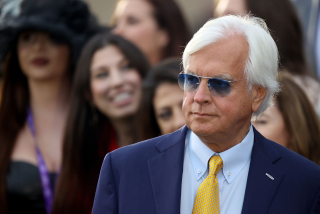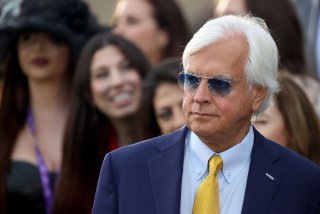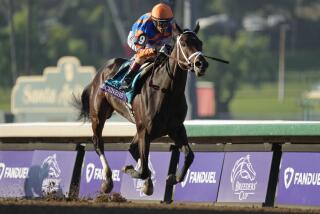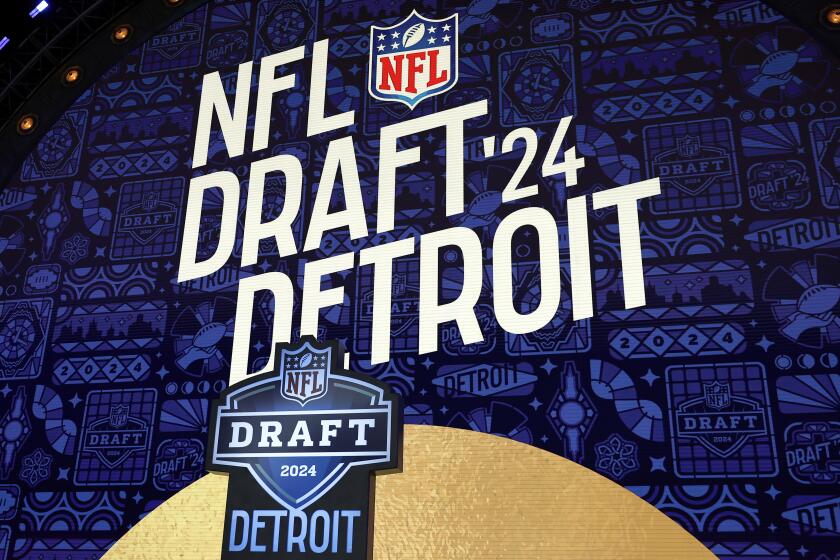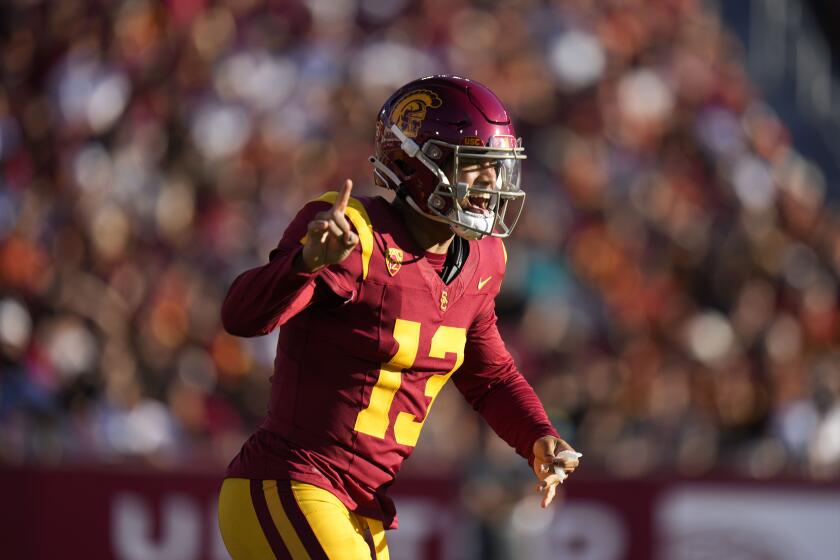Kentucky Derby puts a spotlight on horse racing’s competitive infighting
There is little doubt that the Kentucky Derby is the best-known event in horse racing. It transcends the sport and finds itself in the mainstream with people watching who couldn’t care less the other 364 days a year.
It would seem like the perfect time for this, at times, fractionalized industry, to band together and celebrate what has been called “the greatest two minutes in sports.” But instead, it will be a reminder of the competitive infighting that exists among the services that want to control the betting dollar.
TVG, horse racing’s only full-time television network, will have no one on the grounds at Churchill Downs this week because the track denies it credentials because it has a competing bet-taking service. XBTV, an online network, is also barred from the track because it is affiliated with a different bet-taking service.
Caton Bredar, a popular racing analyst who freelances for TVG, was denied credentials last week to work for a local television station because of her affiliation with TVG. She has worked Derby week for WAVE-3 in Louisville for 18 years. After public outcry, Churchill Downs reversed its decision late last week.
The volatility of the situation made those who spoke to The Times careful not to criticize their competitors.
“I think we’ve done a good job balancing our partner and competitive relationship,” said Kip Levin, the chief executive officer for Betfair’s U.S. operations, which includes TVG. “We continue to discuss new ways to improve how we work together for the benefit of racing fans.”
Churchill Downs agreed to make Bill Mudd, president and chief operating officer of Churchill Downs Inc., available for an interview. But after it was supplied a list of topics, a media representative did not return emails, a phone message or text to schedule the interview. A request was also made to Craig Fravel, president and chief operating officer of Breeders’ Cup Limited, which has a partnership with Churchill’s betting service TwinSpires. It was declined.
At the center of the friction is an online betting service called an ADW, for advance deposit wagering. It’s estimated that 35%-40% of all wagering goes through these services and that number is expected to grow.
An ADW customer has to provide their bankroll up front before any bet can be made. There are four major sites, TwinSpires, owned by Churchill Downs; Xpressbet, owned by the Stronach Group, which owns Santa Anita and other tracks across the country; NYRA Bets, which is an arm of the nonprofit New York Racing Assn., which runs tracks in New York. And then there is TVG, the only one that does not own a track and could not survive if it were just a television network. It must rely on its ADW for profits.
The economics are very complex but the simplest explanation is that the ADWs buy the race-track signal, accept bets from customers, which are mixed into the track pool, and then the ADW charges the track a percentage of the takeout (the amount the track makes on every bet) for facilitating the bet.
The takeout varies by track and kind of bet. It’s generally between 14% and 24% of the amount wagered. If the type of bet has a high takeout, usually multi-horse or multi-race exotic bets, the track and ADW will make more money. The highest profit for the track comes from a wager made directly on track, which it doesn’t have to share with an ADW. The betting services consider all financial numbers and contract details to be proprietary.
In order to attract customers, ADWs offer their customers promotions that can range from free past performances to rebates and refunds. Most serious gamblers use an ADW because of the added benefits.
“We’re competitors in the sense that we slug it out for the best promotions to attract as many customers as we can,” said Scott Daruty, executive vice president of content and media for the Stronach Group, owner of Xpressbet. “On the other hand, we all rely on each other for content and TV coverage. TwinSpires wants Stronach customers and we want theirs.”
NYRA is the newest service to try to crack the national landscape. It started less than two years ago.
“We’ve had to play some catch-up,” said Tony Allevato, president of NYRA Bets. “But we know there is an affinity for the NYRA brand. NYRA runs 5% of the races but has 20% of the wagering across the country. If you look at where the industry is going, it’s moving off track. People are looking for the convenience of betting at home. We need to be in that space.”
Some bettors use their devices to wager through an ADW while at the track … if they are allowed.
Churchill Downs blocks competing ADWs on their public Wi-Fi at the track. NYRA Bets and the Stronach Group tracks in California do not block other sites. In California’s case, there is no need to. All onsite bets made through an ADW are treated as a bet as if it is placed through the mutuel window. California also caps an ADW’s take at 5%, making the state not as lucrative for ADWs.
Jeff Platt, president of the Horseplayers Assn. of North America (HANA), is dismayed by the power of the big four, given that three of them can control who gets their signal and for how much.
“It’s so important to have choices,” Platt said about the big four. “Without choices the player is disadvantaged. The game keeps shrinking. It used to be wide open and there were tons of interest in horse racing. But in the last 12 years, the handle has shrunk, my options have shrunk as have the number of choices that players have. It’s a cause and effect.”
Still, he also sees an ADW as the only way to go for a serious player.
“The innovations by the ADWs have certainly earned my business,” Platt said.
Alex Waldrop, president and chief executive officer of the National Thoroughbred Racing Assn., views the ADWs as working together for a common goal.
“They are all members of the NTRA and have seats on the board,” Waldrop said. “We work very well together on issues of common interest. They were all in support of the recent change to reporting requirements that the Treasury Department handed down. They also worked with us on changes in credit card declines.”
ADWs, as their market share has risen, have had the percentages shifted.
“The margins today are way, way lower than they used to be,” Deruty said. “The pendulum has swung back to better help the tracks and horsemen.”
More to Read
Get our high school sports newsletter
Prep Rally is devoted to the SoCal high school sports experience, bringing you scores, stories and a behind-the-scenes look at what makes prep sports so popular.
You may occasionally receive promotional content from the Los Angeles Times.
